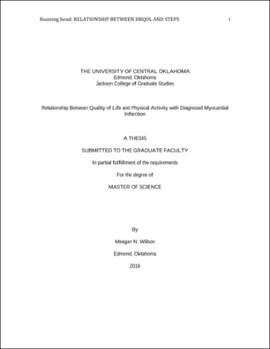| dc.contributor.advisor | Olson, Jacilyn | |
| dc.contributor.author | Wilson, Meagan N. | |
| dc.date.accessioned | 2020-07-09T14:38:54Z | |
| dc.date.available | 2020-07-09T14:38:54Z | |
| dc.date.issued | 2016 | |
| dc.identifier.other | (AlmaMMSId)9982476782702196 | |
| dc.identifier.uri | https://hdl.handle.net/11244/324999 | |
| dc.description.abstract | The purpose of this research was to determine if physical activity is related to health related quality of life (HRQoL) in older adults who have a history of myocardial infarction. This study included eight older adults with history of myocardial infarction who were enrolled in a medically supervised exercise and education program known as cardiac rehabilitation. Each participant completed the HRQoL survey and wore a FitBit for three consecutive days in order to measure physical activity level. A Pearson's correlation test was run. Results showed that HRQoL and physical activity level did not correlate when the data was run with the outlier present (r = .46, P = .29, P > 0.05) or without the outlier present (r = .14, P = .77, P > 0.05). In conclusion, there was no significant correlation between HRQoL and physical activity level in older adults with history of myocardial infarction. The number of participants in this study was less than expected. There were only 8 participants who agreed to participate in the present research study, which was limited by diagnosis and age. During the data collection process, 19 patients enrolled in cardiac rehabilitation either did not have an MI diagnosis or qualify to participate based on age. Three patients, who did qualify, did not want to participant in the study. Further research needs to be conducted with a larger sample size and a wider range of heart diagnoses in cardiac rehabilitation in order to get a more reliable and valid result. The research sample should be open to all patients who have been diagnosed with an MI or who have had heart procedures (Stent/PTCA) or open-heart surgery (CABG) in order to obtain a more reliable measure. The present research study is unique because all patients are post-MI and are enrolled in a medically supervised exercise program in order to educate them on how to exercise and what guidelines to follow. Future research could control for the type of MI each participant has or how many bypasses or stents each participant received and investigate any differences in the results that may appear after analyzing steps per day and HRQoL. | |
| dc.rights | All rights reserved by the author, who has granted UCO Chambers Library the non-exclusive right to share this material in its online repositories. Contact UCO Chambers Library's Digital Initiatives Working Group at diwg@uco.edu for the permission policy on the use, reproduction or distribution of this material. | |
| dc.subject.lcsh | Myocardial infarction | |
| dc.subject.lcsh | Older people | |
| dc.title | Relationship between quality of life and physical activity with diagnosed myocardial infarction | |
| dc.type | Academic theses | |
| dc.contributor.committeeMember | Boyd, Larissa | |
| dc.contributor.committeeMember | Arnold, Barbara | |
| dc.thesis.degree | M.S., Wellness Management - Health Studies | |
| dc.subject.keywords | Myocardial infarction | |
| dc.subject.keywords | Older adults | |
| dc.subject.keywords | Physical activity | |
| dc.subject.keywords | Steps | |
| dc.subject.keywords | Kinesiology | |
| dc.identifier.oclc | (OCoLC)ocn963876996 | |
| uco.group | UCO - Graduate Works and Theses::UCO - Theses | |
| thesis.degree.grantor | Jackson College of Graduate Studies. | |
